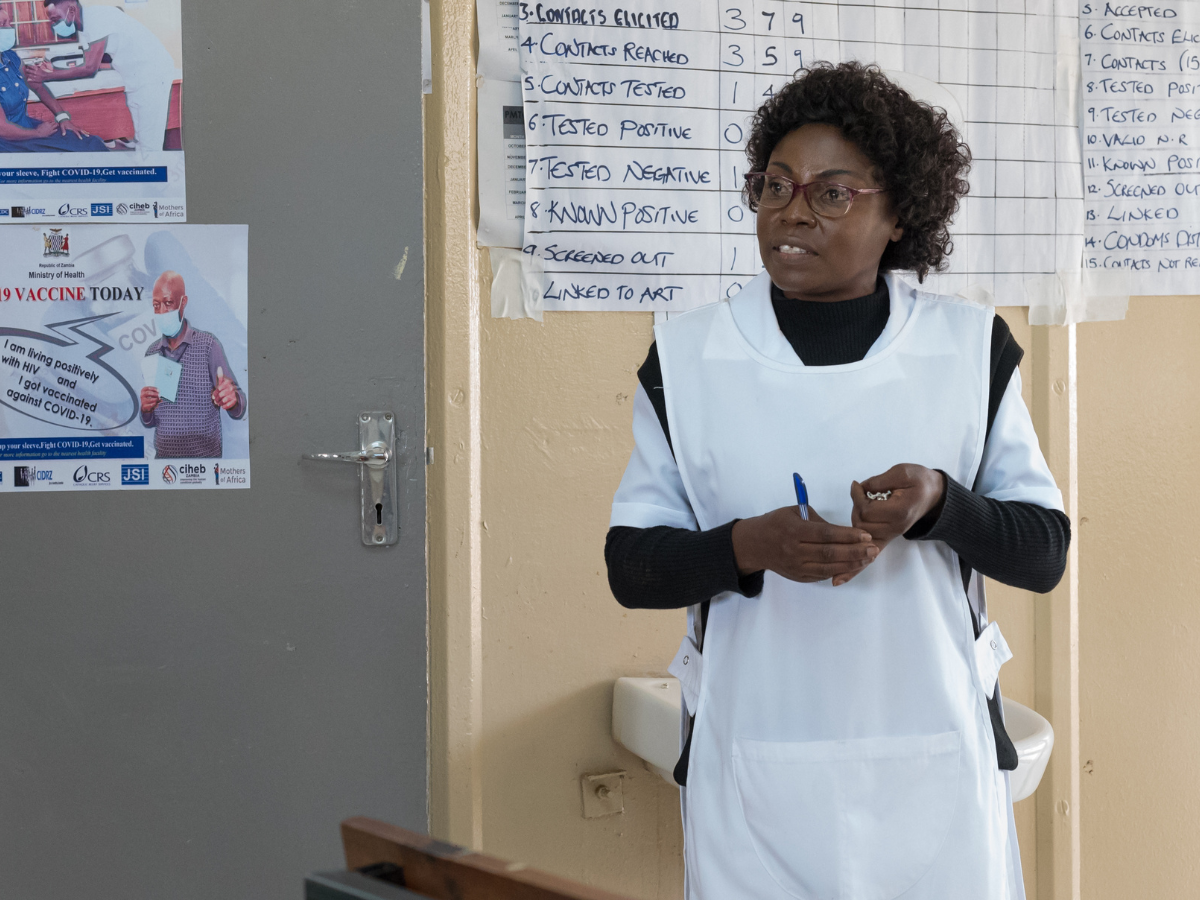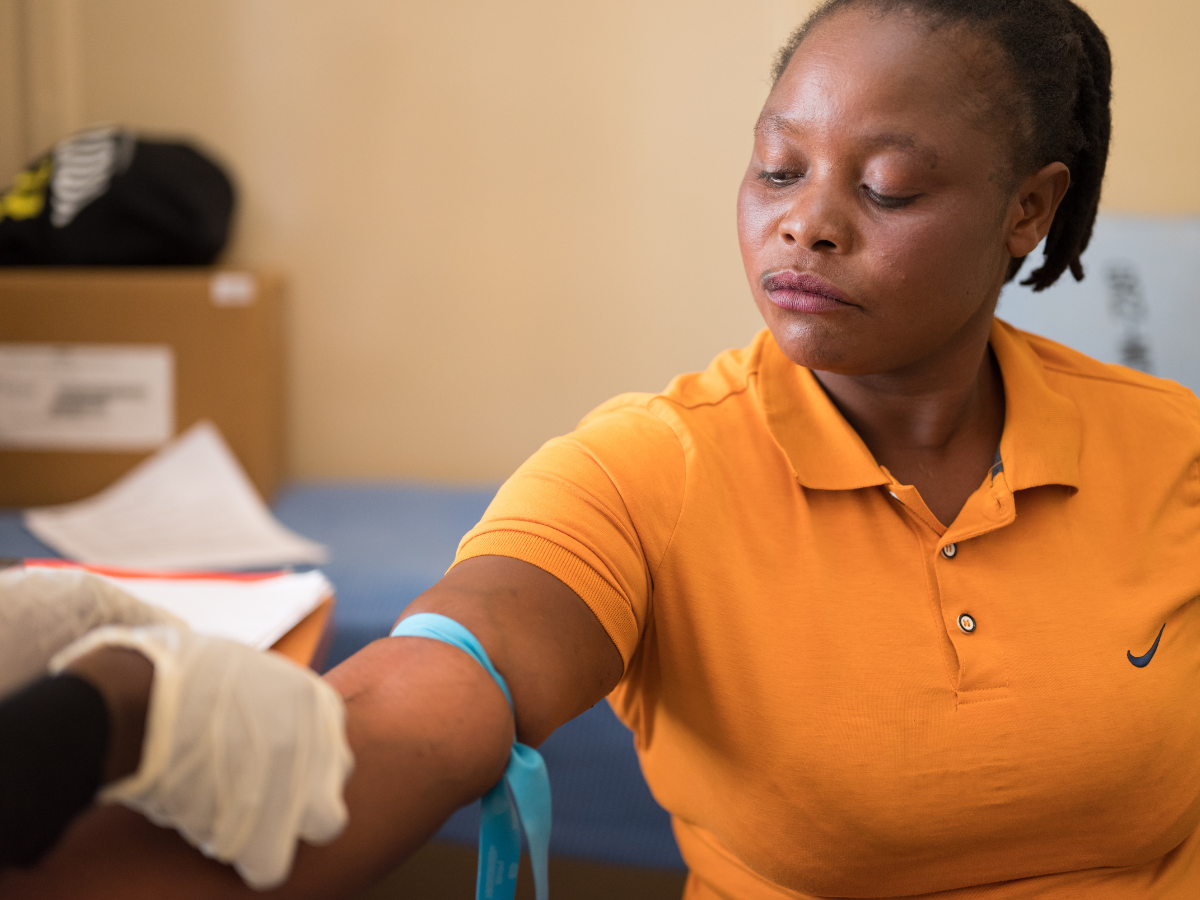Beatrice, who is HIV-positive, has just arrived for her appointment at Mazabuka General Hospital in Zambia’s southern province. Walking into the health facility, she follows the pathway from check-in to check-out like a well-traced line – first, nurses take her vitals, second, she meets with a doctor to discuss her health and medication regimen, third, a health staff administers her viral load test. For the first time, the ICAP in Zambia team has integrated a brief, but valuable fourth step that Beatrice and other recipients of care will take following an appointment – giving feedback about the appointment experience.
In October 2022, ICAP in Zambia introduced the patient feedback kiosk program at Mazabuka General Hospital, which serves both stable and unstable people living with HIV. To improve the care and treatment of their patients, the hospital staff began asking the question: what can we do better? At the end of an appointment, patients are given the option of filling out a survey about their experience. Their answers provide valuable information that the hospital uses to build more effective programs and productive systems.
“After feedback is given, authorized personnel can access it and give the information to the staff to record,” said Sister Bibi, lead nurse at the hospital. “Every month, we work toward targets informed by the kiosk.”

Sister Bibi, lead nurse at the Mazabuka General hospital, stands in front of one of the indicator trackers the health facility uses to meet targets.
In three different languages that people can choose from based on preference, including English, Lozi, and Tonga, the kiosk asks patients a series of simple questions – how was the service you received today? What did you like about the services you received today? What would you like to see improved? – and offers multiple answers people can choose from. The survey takes only 1-2 minutes, and, if needed, can be read aloud to a patient who cannot read. It’s the first program of its kind in Zambia.
ICAP in Zambia has faced, and overcome, challenges that arose at the launch of the program. One of these was low utilization of the system. Initially, there was only one person authorized to guide patients through use of the kiosk, which impeded participation and led to incomplete answers. To address this issue, the hospital trained additional volunteers to guide patients through the kiosk and also began asking patients at the end of their appointments if they wanted to participate and give an objective review of all the services accessed on that day.

Job Mwanza, technical director of ICAP in Zambia, discusses the value of patient feedback for health facility quality of care.
From October 2022 to March 2023, 542 patients participated in the kiosk survey, and since then, teams have already begun integrating feedback into hospital programs. When some patients gave feedback that they’d like to see improved attitudes from their care providers during appointments, health staff underwent “customer care” training to better relate to their patients. When feedback showed patients were enduring long waiting periods at the hospital, health staff developed time slots for stable and unstable patients to arrive at the hospital, decreasing crowding and improving organization. When the survey showed that some patients were not aware of their viral load results, the team brainstormed what materials they could develop, such as the use of viral load-related job aids in the form of flipcharts, that could prompt staff to discuss viral load results, increasing understanding for a patient before they leave an appointment.

Beatrice, a woman living with HIV, receives a viral load test.
Now that the survey has been developed, the team will continue to evaluate whether new questions should be added or current questions revised.
“Data is a powerful tool,” said Philip Koni, strategic information director at ICAP in Zambia. “This kiosk is helping us understand what patients really desire from a doctor’s appointment and what might improve their experience at the facility, thus increasing the likelihood they would come again, and ultimately improving their health outcomes in the long run. With that, this is an evolving process, and we want to be sure that we are adapting this tool as often as possible so that we can get the most out of the program and ensure it is relevant.”
Home to the largest sugar-manufacturing company in the country, Mazabuka is known as the “sweetest town” in Zambia. As many patients at the hospital are sugar farmers working long days in the field, retention can be inconsistent, which impacts adherence to lifesaving medication. For patients who miss appointments, community mobilizers trained by ICAP and based at Mazabuka General Hospital conduct home visits to follow-up with them – another example of going the extra mile to ensure recipients of care receive the attention they need.
“We’ve seen a lot of growth both in numbers and quality of service at this hospital with the deployment of a patient-first mentality,” said Job Mwanza, technical director of ICAP in Zambia. “We all learn from one another.”
Photos taken by Artur Francisco for ICAP
About ICAP
A major global health organization that has been improving public health in countries around the world for two decades, ICAP works to transform the health of populations through innovation, science, and global collaboration. Based at Columbia Mailman School of Public Health, ICAP has projects in more than 40 countries, working side-by-side with ministries of health and local governmental, non-governmental, academic, and community partners to confront some of the world’s greatest health challenges. Through evidence-informed programs, meaningful research, tailored technical assistance, effective training and education programs, and rigorous surveillance to measure and evaluate the impact of public health interventions, ICAP aims to realize a global vision of healthy people, empowered communities, and thriving societies.








